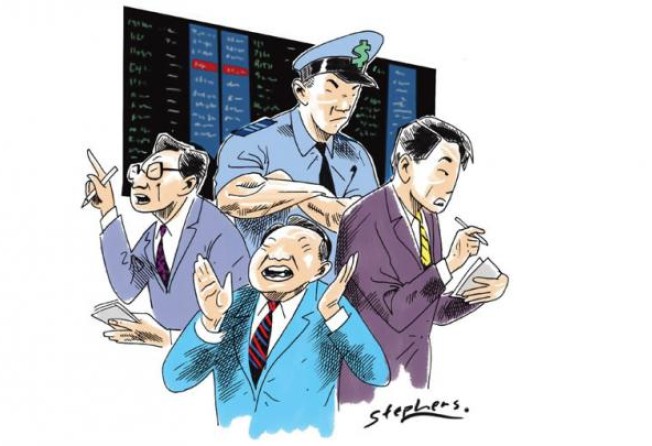Plugging the gaps in financial regulation in HK
Eddy Fong charts the reforms the SFC has carried out to bridge the gaps exposed by the 2008 financial crisis, including steps to upgrade its day-to-day regulation and enforcement

When I became the first non-executive chairman of the Securities and Futures Commission (SFC) in 2006, the world was cruising on a path of moderate growth, stable employment and subdued inflation, and asset prices were continuing to rise. Less than a year later, the world was hit by the subprime crisis that shone a spotlight on opaque markets that operate in the shadow of regulated markets.
Lehman Brothers' collapse in September 2008 brought global financial markets to a near meltdown, highlighting their highly interconnected nature. The resulting recession presented unprecedented challenges to central banks, regulators and governments around the world.
As the worst-affected economies began to recover, the emergence of the sovereign debt crisis, which in Europe has morphed into a euro crisis, pushed these economies back into recession. In Asia, growth has begun to slow. Uncertainty remains as markets have yet to be fully convinced that the much-needed regulatory, fiscal and structural reforms will be implemented.
The failure of Lehman was a wake-up call to the reality that financial institutions operate globally, while regulation stops at national borders. The financial tsunami that Lehman's failure unleashed sparked an international debate on the fundamental role of financial institutions and calls for a return to basics. The G20 leaders promptly initiated global financial reforms that go beyond traditional boundaries of regulation.
Hong Kong's securities market is global, it has a vibrant domestic dimension, and it is plugged in to mainland China.
Hong Kong's investor profile is split almost evenly between Hong Kong and international investors. Two-thirds of investors are institutional; retail investors are significant, representing about one quarter of investors. Funds from non-Hong Kong investors account for more than 60 per cent of the Hong Kong asset management business. Getting the regulatory balance is a challenge.
The collapse of Lehman Brothers affected many investors in Hong Kong. The Monetary Authority and the SFC received tens of thousands of complaints, the most common of which was about misrepresentation, complexity and suitability of the structured products.
As a member of the Financial Stability Board, Hong Kong is committed to implementing the G20 financial reforms. The SFC's engagement in international work increased considerably as a result of the work of International Organisation of Securities Commissions, the international standards-setter for securities regulation, and the G20 reforms.
As part of global reforms, the SFC began to license and regulate credit rating agencies. A new regulatory regime for the over-the-counter derivatives market in Hong Kong is in the pipeline. On its own initiative, the SFC introduced a reporting regime to monitor more closely short-selling activities and increase market transparency through the publication of aggregate short positions of individual stocks.
The SFC has also stepped it up in three areas in order to meet the challenges of today: its day-to-day regulation and enforcement, market facilitation and investor education.
First, enforcement action has been significantly strengthened over the years, and since 2007 there are more cases involving novel or complex regulatory policies, legal issues or innovative solutions. The SFC has had a number of successful convictions for insider dealing, sending a powerful deterrent to those who may be tempted to defraud the market. We have also commenced a number of civil actions to secure remedial outcomes from perpetrators of fraud and misconduct.
Two, an important aspect of market facilitation is Hong Kong's co-operation with the mainland, which has enabled the city to be the platform for the mainland's "going-out" strategy and the proxy for the mainland market. The SFC has also been active in facilitating the flow of qualified personnel between the mainland and Hong Kong, and in providing opportunity to the subsidiaries of mainland financial institutions to operate in Hong Kong.
Other recent initiatives include the introduction of renminbi products between the two markets and working with the Hong Kong stock exchange on streamlining regulation relating to other overseas companies seeking listing here.
Third, investor education is an important regulatory tool to empower the investor with the basic knowledge of products and risks, and of their own rights and responsibilities.
Technological advancement has enabled the rapid expansion of trading venues other than the traditional stock exchange platform, dramatically improved the speed, capacity and sophistication of trading functions, and allowed customers direct access to markets. Currently, such activities are prevalent in the US and Europe, but are not significant in Hong Kong.
This development has sparked international debate on the potential impact on fragmentation of liquidity, price discovery, orderly markets and fair treatment of investors. Separately, the SFC has just finished consulting the market on the regulation of electronic trading.
The global and domestic financial reforms will revamp the tool kit of regulators, who will need to re-equip themselves with the necessary skill sets to use these new powers. Regulation will have to take on a more holistic approach, with greater co-ordination and co-operation, including on a cross-border basis.
Equally important is the need to maintain open channels of communication with stakeholders. Engaging market participants on emerging market developments that may be of regulatory concern would help to enhance the effectiveness of regulation for maintaining fair, orderly and efficient markets.
The SFC is cognisant of the challenges ahead for Hong Kong and constantly reviews its resource requirements.
It will continue to remain vigilant in the regulation of the securities and futures market and adopt or adapt its regulatory regime to maintain investor confidence and trust in the Hong Kong market.
Dr Eddy Fong is chairman of the Securities and Futures Commission